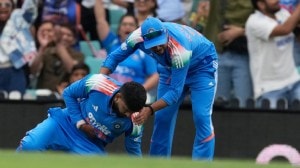In Cauvery delta, farmers fight snakes for a meal: rats
Under the blazing June sun that has sucked the moisture from the ground and left it stone-hard, farmer K Subbaiyan is digging. Every now and...

Under the blazing June sun that has sucked the moisture from the ground and left it stone-hard, farmer K Subbaiyan is digging. Every now and then, his hopes rise as he chances upon a rat hole. But there are no rats inside, just the odd snail. Tonight, Subbaiyan’s family will have to make do with snail kozhumbu (gravy).
Some days, Subbaiyan gets lucky. Recently, he managed to snare four rats. Roasted, they were stuffed with red chillies and salt and gobbled by the hungry family.
As Karnataka refuses to release Cauvery water to Tamil Nadu, it’s no longer uncommon to see agricultural workers in the delta region hunting for rats. Finding the rats, however, has become difficult.
‘‘Even they have become scarce, because we have been catching rats for the last two years now,’’ says K Petharumal, another farmer from Sevalakkaran village in Mannargudi taluk, near Thanjavur. ‘‘In this weather, the snakes have come out and are vying with us.’’
But this is not a story about the strange eating habits of farmers around the tail-end of the Cauvery. Decades ago, their forefathers, equally deprived, did occasionally hunt for rats but gave up the practice as it was not ‘‘civilised.’’ Now, with quiet desperation— even as a Central team tries to resolve the inter-state dispute — these men are reverting to a habit long abandoned.
A drought that has stretched across three years has taken its toll. The water table in Tiruvarur and Nagapattinam districts is low and sailne, so sinking borewells is not an option.
|
WATER WOES: Waiting
for a decision |
|||||
|
• Karnataka, which is also facing a severe water shortage, says it has just 24 TMC ft water in its four reservoirs as against the capacity of 114.5 TMC ft. The State did not have a great monsoon, either. |
|||||
Paddy cultivation makes sense only if Karnataka releases Cauvery waters to the Mettur dam, which then opens its shutters on June 12 every year to supply water to the farmers. But that has not happened for three years. And the farmers don’t expect it to change.
A senior Tamil Nadu government official confirmed their fears. ‘‘Unless the dam has a storage of 35,000 million cubic feet, we cannot release water,’’ he said. Today, the storage is just 11.395 tmc feet.
This dismal arithmetic has changed the landscape of the area and the lives of people who can no longer legitimately call themselves farmers. Most have already turned their backs on agriculture.
Acres of fields are now covered with shrubs and the remains of a paddy crop that no one has bothered to even remove. Many of the villages are deserted as men and women have migrated to Kerala, Karnataka to work in textile-dyeing units or as workers in other farms.
‘‘How else do I feed my son and daughter?’’ asks 38-year-old S Ramanian from Tirukuvalai taluk, the birthplace of DMK president M Karunanidhi. He has just returned from a dyeing unit in Kerala and plans to go back next month.
Adds Melavazhakarai panchayat president S Tamaraiselvan: ‘‘There is no point in sowing the seeds, the crop will wither without water.’’
Meanwhile, the government schemes that were supposed to help them have failed to deliver:
• The Food for Work programme, suspended till the elections, has not resumed in many villages even a month after the polls. The Nagapattinam district collector Veeerashanmughamani says he has provided Rs 2 lakh for this programme to each hamlet. However, it could not be taken up in some parts because people had migrated to Kerala. In other parts, rains have stopped the desilting. And some farmers complained that the daily wage of Rs 14.45 a day and seven kilos of rice were just not enough to sustain their families.
• The black market has crippled the Public Distribution System. While each card-holder is entitled to 20 kg of rice a month at a rate of Rs 3.50 a kg, most end up getting only half the amount. Much of the stock gets diverted and sold in the open market at Rs 12.50 a kg, which farmers cannot afford.
• The only scheme that appeals to farmers like Subbbaiyan is the mid-day meal scheme in schools. This means his three boys are assured at least one meal. For the rest, he must hunt for rats.
Panchayati Raj Minister Mani Shankar Aiyar’s consituency of Myladuthurai falls within Nagapattinam, the drought-hit delta district. However, the panchayat presidents say they are helpless. Melvazhakkarai panchayat president S.Tamaraiselvan says Food for Work programme has not taken off in his village. ‘‘My panchayat has no funds for taking up any work to alleviate the farm workers’ problems. Most schemes are centralised, so what can I do?’’





- 01
- 02
- 03
- 04
- 05


























